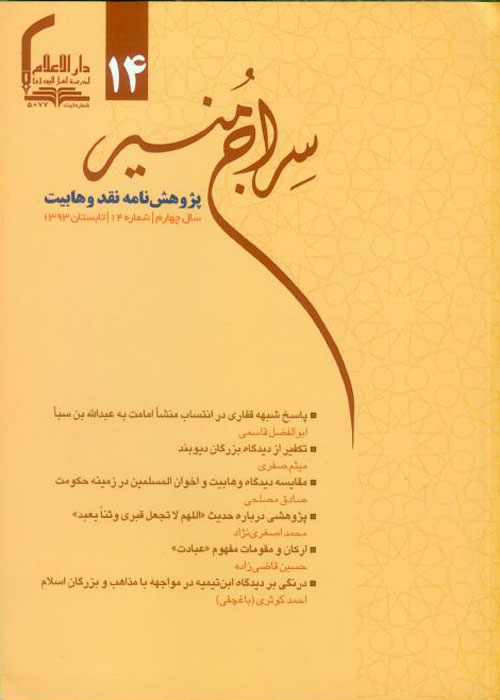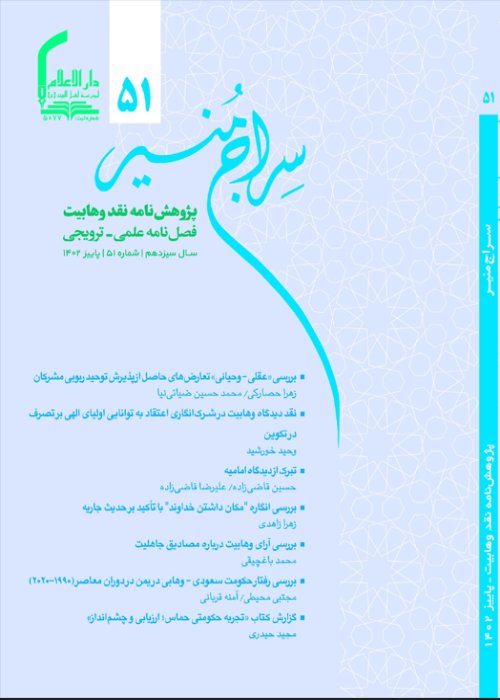فهرست مطالب

نشریه سراج منیر
سال چهارم شماره 14 (تابستان 1393)
- 200 صفحه، بهای روی جلد: 70,000ريال
- تاریخ انتشار: 1394/01/08
- تعداد عناوین: 9
- سرمقاله
- گفت و گو
-
تاثیر افراط گرایی شیعه بر گسترش سلفی گری تکفیری / در مصاحبه با استاد قاسم جوادیصفحه 11
- مقالات
-
صفحه 23
از جمله نظریه های موهوم در باب پیدایش تشیع، نظریه پیدایش تشیع در نتیجه تلاش های عبدالله بن سبا است. چندین قرن است که مخالفان تشیع این نظریه را مطرح می کنند. در این میان ناصر القفاری، یکی از علمای معاصر وهابیت، همین ادعا را با استناد به متون و منابع شیعه به گونه ای متمایز و متفاوت از دیگران بیان کرده است. در این مقاله به شبهه قفاری پاسخ داده شده است. این شبهه با سه دلیل رد شده است: 1. وجود دلایل معتبر بر پیدایش شیعه به همت پیامبر اسلام؛ 2. بررسی نقلی که شیعه را منتسب به عبدالله بن سبا کرده است؛ 3. تعارض عقاید عبدالله بن سبا با شیعه دوازده امامی. با توجه به بررسی های انجام شده این نتایج حاصل شد که منشا شیعه از زمان پیامبر اسلام بوده است و عبدالله بن سبا، بر فرض وجودش، عقایدی غیر از عقاید شیعه داشته است و منابع شیعی هیچ کدام منشا شیعه را عبدالله بن سبا ندانسته اند.
کلیدواژگان: شیعه، عبدالله ابن سباء، قفاری، منشاء شیعه، غلو، امامت -
صفحه 41
مذاهب اسلامی، به ویژه مکتب دیوبند، جریان اعتدالی و به دور از افراطی گری می باشد. و نمی توان رفتارهای افراطی و تکفیری برخی از گروه ها که از مکتب دیوبند به بهانه های مختلف و بدون پشتوانه فتاوای بزرگانشان، به جان مسلمانان افتاده و آنها را تکفیر و بعضا به قتل می رساند را به حساب کل مکتب دیوبند گذاشت. مقوله تکفیر از صدر اسلام وجود داشته و مخصوص زمان یا افراد یا فرقه خاصی نیست و مذاهب اسلامی برای آن ضوابط و اصولی را مشخص کرده اند. این نوشتار ضمن بیان معیار اسلام و کفر و تبیین ضوابط و اصول تکفیر از دیدگاه بزرگان دیوبند به دنبال اثبات این حقیقت و واقعیت است که بزرگان دیوبند، مسلمانان و اهل قبله را به بهانه های واهی تکفیر نکرده اند و اگر عده ای به نام دیوبند، مسلمین را از دین خارج کرده و بعضا علیه اهل قبله عملیات های تروریستی انجام دهند نمی توان کل مکتب را به افراط و تکفیری بودن متهم کرد.
کلیدواژگان: مکتب دیوبند، تکفیر، اهل قبله، ضروری دین -
صفحه 63
وهابیت و اخوان المسلمین دو گروه سلفی هستند که در زمینه حکومت اختلاف نظر اساسی دارند. وهابیت توجه چندانی به بحث حکومت ندارند و اطاعت از حاکم را، هرچند فاسق باشد و با زور به حکومت رسیده باشد، لازم می شمارند. اما اخوان المسلمین هدف اصلی خود را تشکیل حکومت اسلامی برای اجرای احکام اسلام قرار داده، حکومت را تا زمانی مشروع می دانند که به احکام اسلام عمل می کند. وهابیت اعتقادی به انتخابات و شیوه های جدید سیاسی و رای مردم خصوصا زنان ندارند، اما اخوان مردم را یکی از پایه های مشروعیت حکومت و صاحب حق عزل و نصب حاکم می دانند.
کلیدواژگان: وهابیت، اخوان المسلمین، حکومت اسلامی، مشروعیت حکومت -
صفحه 87
در این مقاله درباره حدیثی از رسول خدا (ص) با مضمون «اللهم لا تجعل قبری وثنا یعبد» که بیشتر در منابع اهل سنت و وهابیون مطرح شده، تحقیق، و رجال آن و محتوایش ارزیابی می شود و مشخص می گردد که مفهوم آن چیست و آیا چنین روایتی از رسول اسلام صادر شده است یا نه و بر فرض صدور، چه معنای قابل قبولی دارد. مضمون این حدیث در برخی منابع شیعی هم طرح شده است. اعتقاد نگارنده بر جعلی بودن این حدیث است. ما این برداشت را رهیافت اساسی این نوشتار می دانیم و درباره آن تحلیلی ارایه می دهیم و اشاره کوتاهی به خاستگاه این حدیث و جعلی بودنش می کنیم.
کلیدواژگان: حدیث اللهم لا تجعل قبری و ثنا یعبد، اهل سنت، وهابیت، رسول خدا (ص)، زیارت قبور، شرک، بت پرستی -
صفحه 109
عبادت به عنوان یک مفهوم کلیدی، ارکانی دارد که در تعریف آن باید لحاظ شود. هر تعریفی به اندازه ای که از این ارکان دور است از صحت نیز دور خواهد بود. مفهوم «عبادت» برای تحقق محتاج وجود سه مولفه «معبود»، «عابد» و «عمل عبادی» است. هر یک از این مولفه ها خصوصیاتی دارد که ما از آنها به عنوان ارکان مفهوم «عبادت» یاد می کنیم. اما آنچه از عنوان معبود می توان استنباط کرد این است که معبود، طبق آیات قرآن کریم، زمانی اطلاق می شود که عنوان «الاه» بر آن صادق باشد که بیانگر مقام الوهیت در تحقق مفهوم «عبادت» است. از این جهت که عنوان عبادت برای عمل مشرکان هم استعمال شده مشخص است که مراد از الاه، الاه واقعی نیست، بلکه الاهی است که «عابد» به آن معتقد است و این موضوع (الاه اعتقادی) نخستین رکن مفهوم عبادت است که از عنوان «معبود» و «عابد» استنباط می شود. دومین موضوعی که از عنوان «عابد» قابل استنباط است خضوعی است که در ضمیر «عابد»- نه نفس عمل - نسبت به معبود وجود دارد و این دومین رکن این مفهوم محسوب می شود؛ و سومین رکن، که در «عمل عبادی» نهفته است مطلوبیت و رجحان نفس عمل برای معبود است. ترکیب این سه رکن، محقق مفهوم «عبادت» است. در مجموع باید گفت عبادت یعنی «انجام عملی راجح از روی خضوع در مقابل الاه».
کلیدواژگان: عبادت، معبود، عابد، عمل عبادی، اله، وهابیت - گزارش ها
-
Page 23
One of the fictitious theories on the origins of the Shiism is the theory which considers Shiism a result of Abdollah Ibn Saba’s efforts. This theory has been put forward by Shia objectors for centuries now. Among them, Naser Alqaffari, one of the contemporary Wahhabi scholars, referring to Shia sources and books has claimed the same thing but differently from others. In present writing this claim will be rejected based on three reasons: 1.Existance of prevailing credible proves that Shiism was originated as a result of Prophet Mohammad’s (PBUH) efforts. 2. Analysis of the narration in which Shiism is attributed to Ibn Saba. 3. Ibn Saba’s contradictory believes to those of twelve-Imam Shiism. According to the conducted analyses we can conclude that the origins of Shiism dates back to the very time of Prophet Mohammad Himself. Ibn Saba, supposing such person ever existed, had believes totally different than those of the Shiites. And none of the Shia sources has considered him as an origin of Shiism.
Keywords: Shia, Abdollah Ibn Saba, Qaffari, origin of Shiism, exaggeration, Imamate -
Page 41
Islamic schools of thought specially Deobandi are moderate movements and are away from extremism. And we cannot consider those extremist takfiri groups which for certain reasons, were formed within Deobandi school of thought, and have no support of the said school scholars, excommunicating and killing the Muslims, as the whole body of the school. The issue of takfir or excommunication has existed since early days of Islam and does not belong to a certain time or sect of Islam. And Islamic schools of thought have set some special standards and rules for it. This writing tries to explain the criterion for being Muslim or Kafir and clarify the standards of excommunication in Deobandi School. And tries to prove that the scholars and figures of Deobandi have not excommunicated the Muslims the people of Qibla according to delusive pretexts, and if some people in the name of this school, have excommunicated some of the Muslims and carried out terrorist attacks on them, the whole school cannot be accused of extremism.
Keywords: Deobandi school of thought, people of Qibla, necessary of religion -
Page 63
Wahhabism and The Muslim Brotherhood are two Salaffist groups but have fundamental disagreement regarding the issue of governing. Wahhabism does not consider the issue of governing seriously. For them obeying a ruler, although a libertine one, is a must. On the other hand, the main goal of The Muslim Brotherhood is to establish a government so that the Islamic rules are preserved. They do not consider a government legitimate unless the Islamic rules are enforced. Wahhabism does not believe in new political procedures and especially in women’s vote, but the latter regards people as one of the major criteria for legitimacy of a government. And give them the right to elect and bring down governments.
-
Page 87
In this article a hadith of Prophet Mohammad is analyzed. The hadith which is mentioned mostly in Sunni and Wahhabi sources, says “oh Allah do not put my grave an idol to be worshiped”. After analyzing the chain of narrators and the content of this hadith it will be clear if it has been said by Prophet Mohammad or not. And if so, what did he mean by that. This hadith has been mentioned in some of Shia sources too. The writer of this article believes that the said hadith is fictitious. This understanding will be the main approach of this writing, and an analysis is given to prove this understanding. And we will shortly discuss its origins and why it is fictitious.
Keywords: the hadith of اللهم لا تجعل قبری وثنا یعبد, the Sunni, Wahhabism, the Messenger of Allah, pilgrimage to the tombs, polytheism, idolatry -
Page 109
As a key concept, worshipping has some elements that need to be taken in to consideration. The more irrelevant any definition is to these elements, the more incorrect it will be. The concept worshipping needs three elements to be actualized; the worshiped, the worshipper and the devotional act. Every single of these components have certain features, these components are called elements of the concept of worshipping. We can infer from the term the worshipped that, according to Quran, we use the word worshipped for a deity. The worshipped should have godship, so that the worshipping has its actual meaning. Since the term worshipping is used for the deeds of the polytheist, too, it is obvious that here the god or deity is not a real one, but it’s a god that worshipper believes to be real. This can be inferred from the first and second element of worshipping. The second thing that can be inferred from the term the worshipper is the humble submissiveness toward the worshipped found within the worshipper not his action. And this is considered as the second element. And the third element which is hidden in the devotional act is the preference and importance of the act itself for the worshipped. Combination of these three elements actualize the concept of worshipping. generally speaking, worshipping means “doing a preferable act out of humble submissiveness toward God”
Keywords: worshipping, the worshipped, the worshipper, devotional act, deity, polytheism, Wahhabism


